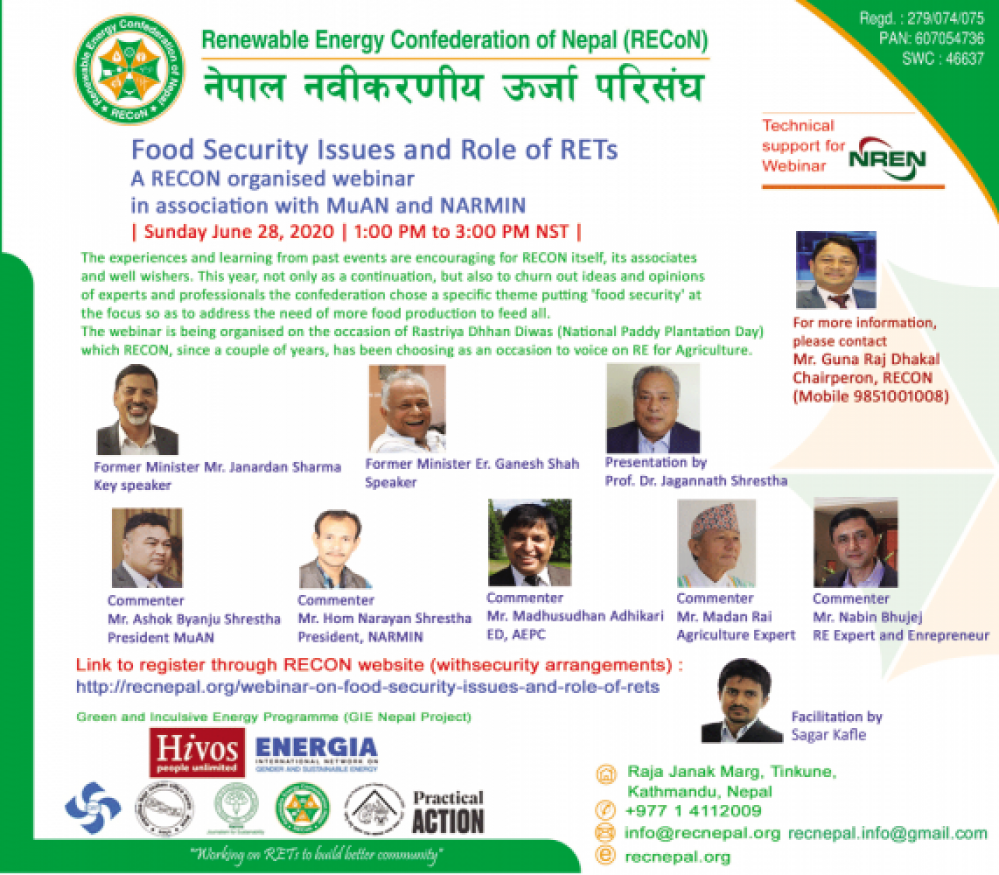
On the occasion of Rastriya Dhaan Diwas (National Paddy Planting Day) Renewable Energy Confederation of Nepal (RECON) in association with Municipality Association Nepal (MuAN) and National Association of Rural Municipalities in Nepal (NARMIN) on Sunday June 28, 2020 organised a webinar on Food Security Issues and Role of RETs.
Asar 15 (June 29 this year) is a festival to celebrate planting day for the farmers' community. Non- farmers also take part in this festival paying respects to the agriculture trade for efforts and labour to produce food grains, especially rice as the main food material most people prefer in the region. Food security, the terminology developed later has close connection with Asar 15 in terms of producing more to feed all.
Leaders, academia, experts and professionals participated in the virtual event to express opinions, share experiences and opinions on the subject matter. Keeping in view the role of renewable energy technologies at the centre, they discussed the need of food production in quality and quantity of food for all by utilising natural resources, appropriate technologies, quality input and enhanced capacity to the farmers. They also stressed on farmers' living status to be socially recognised. Similarly stress was given on the use of renewable technology in terms of food production and its preservation.
Key speaker of the webinar Former Minister Mr. Janardan Sharma elaborated that agriculture is the opportunity for the country to maintain the economy. Ongoing coronavirus pandemic has added further challenge to create employment opportunities to the Nepalis coming home back losing jobs abroad. Thus, managing food to all is being become a big challenge. He added that there is wider scope in cultivating unused lands due to lack of irrigation. The water flowing rivers and streams down the dry lands can be irrigated using Solar Photo Voltaic Pumping Systems and other means of the energy whatever available. That will create additional employment opportunities as well. Furthermore, preserving of agriculture products by using Solar dryers and cooling chamber could stop waste of food materials while farmers would get better price including their cost of extra labour included.
Former Minister Er. Ganesh Shah speaking on the occasion stressed on farmers' living should be socially recognised so as their cost should be returned well by selling their products. Irrigation facilities for the arable lands, better inputs such as seeds and fertiliser and technologies should be accessible and available on time. Likewise, financial services should be farmer friendly. As such, studies and activities of research and development and trainings should be a priority for capacity development. Then the objective of producing more to feed all will be all successful, he added. Further Shah stressed on four major points to improve food security through renewable energy interventions: Policy intervention, Innovations, Access to finance and fund mobilization, and climate smart agriculture. He also stressed on the proper use of agriculture residue especially for bio-energy and fertilizer with closing the loop of food cycle even doing proper faecal sludge management technique.
Prof. Dr. Jagannath Shrestha who contributed immensely in studies and researches on renewable energy for various sectors presented on 'Increasing Food Security through Renewable Energy Supported Development in Agricultural Sector'. He mentioned that there are 1 million hectors of arable land are uncultivated. Solar PV Pumping System and other energy technologies can irrigate the dry lands to produce food. It will contribute to Food Security movement. Likewise various accessible and available technologies should be deployed to stop waste of agriculture products by making systems affordable to farmers. Thus, RETs can support immensely to the Food Security drive, he argued.
Mr. Madhusudhan Adhikari, Executive Director of Alternative Energy Promotion Centre (AEPC) informed that government policies and programmes are supportive to agriculture sector through promotion and development of renewable of renewable energy. The centre is working together with government agencies, provincial governments, local governments, development partners, universities, research organisations, RECON like organisations, private sector and professionals to deliver technical and financial supports for promotions and development of renewable energy technologies. Large Bio-gas Plants, Mini-grid and Irrigation systems are at the priority of the centre's programmes while more focus has been gathered in the programmes of the FY 2077-078.
Agriculture Expert Mr. Madan Rai mentioned that agriculture is a continuative occupation, so as conducive environment should be maintained for the farmers to live with high will power. The indigenous technologies and practices need to keep up the ethnic and local practices for the best production chains with traditional values.
Mr. Nabin Bhujel, renewable energy expert and entrepreneur said that private sector has an important and strong role in delivery of services and systems in context of contributing to promotion and development of renewable energy technologies as well. The government agencies should consider well to manage their services and supplies with better monitoring and evaluation mechanism. Financial arrangements and capacity development of the private sector will bring highly meaningful results to support Food Security movement to produce more food to feed all. Therefore, role of private sector should be recognised as one of the vital part in the movements.
RE Expert and Agriculture Entrepreneur Mr. Babu Raja Shrestha, on the occasion said that the policies and programmes should be practically sound rather than stressing more on theoretical strength. The academia, experts, professionals and other stakeholders should consider on practicable methodologies, improvised machine and tools to produce better quality and quantity of food to make food security movement to bring into reality.
Dr. Indira Shakya, RE and GESI Expert and Manager of Green and Inclusive Nepal Programme stressed need of equal opportunity for women to involve in the RE programmes. Food Security Issues and Role of RETs needs women, poor, disable and unprivileged communities to be included with supportive modalities of RETs as accessible, available and affordable to them.
Mr. Vishwa Prasanna Amatya, Mr. Padip Maharjan and others also spoke on the subject matter in the webinar.
In the beginning of the webinar, Vice President of RECON Mr. Uttam Sitaula welcomed the all guests and participants saying that the confederation had organised interaction and discussions programmes in the past with objective to share views and opinions experts and professionals support the policymakers, planners and executing agencies to utilise RETs for benefit of all. On the occasion of Rastriya Dhaan Diwas the confederation has been organising interactions and discussion programmes since last four years with focus on RE for Agriculture as a vital ital issue concerned to all sector of the society , he added. Mr. Sitaula also mentioned that RETs are supportive to clean cooking solution, transportation, communication, education, health facilities and industrialisation and so on. The private sector is contributing to promotion and development of RETs by supplying services and systems. So as, engaging for the Food Security movement is one other important role to the private sector, he mentioned.
RECON Chairperson Mr. Guna Raj Dhakal concluding the virtual event said that the webinar is successful in findings and recommendations on the subject matter. Agriculture is not only farmers' concern but also well planned strategies could contribute to better food production, employment opportunities, using of inputs produced in the country and support to reduce trade deficit are interlinked with this occupation, he added. The experts and professionals expressed facts and figures useful for formulating policies and programmes for food security, enhancing agriculture occupation, farmers' living standard and contributing to national economy will be submitted to concerned authorities for the best of actions, Dhakal mentioned.
The webinar was moderated by Mr. Sagar Kafle who is Secretary of Nepalese Society of Agriculture Engineers.
Title |
Attachment |
|
| Increasing Food Security through Renewable Energy Supported Development In Agricultural Sector | Download | Prof. Dr. Jagan Nath Shrestha |
| Food Security Issues and RETs | Download | Mr. Madhusudhan Adhikari |




